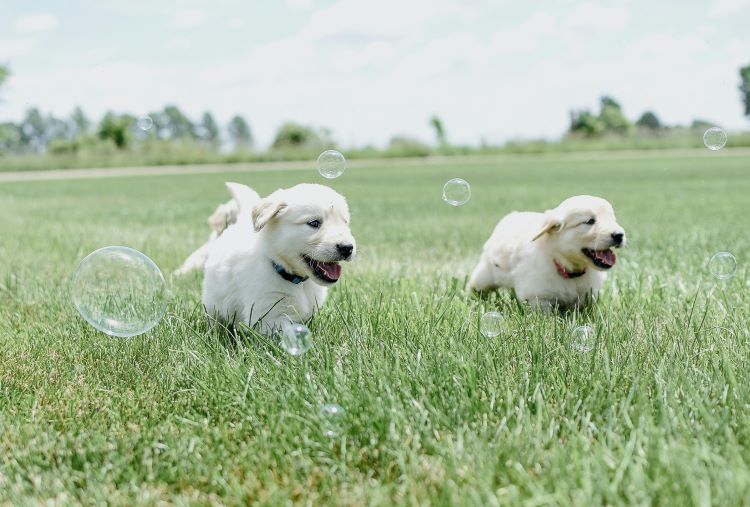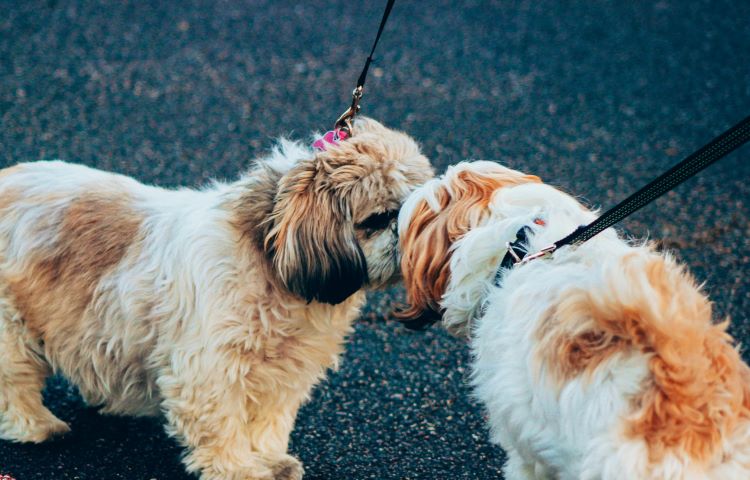Ready to help treat your pet to a healthy life?
How to Socialize a Puppy: a Guide for Long-Term Success
By : Trupanion Staff | Published Aug 15, 2024

A well-socialized dog is a healthy, happy dog. But are you starting the dog socialization process early enough? For best results, your canine companion should begin building their social skills while still a puppy. In fact, researchers from the University of Helsinki found that puppy socialization is the most important environmental factor in shaping a dog's eventual personality.
Most socialization involves giving your pet a variety of real-world experiences that’ll help them throughout their lifetime. Exposing your young dog to people, animals, and situations encourages brain development and reduces stress on pet and pet owner alike.
While there are a few critical windows for effective canine socialization, the earlier you start, the better. Make the most of those early weeks and months with these puppy socialization tips. Help your growing pup develop social skills that last a lifetime.
Why socializing a puppy is important
Learning to deal with new situations helps a puppy become a friendlier, well-mannered, and less aggressive and fearful dog. Well-socialized puppies also have more focus during future training.
At the same time, introducing a puppy to new situations is important for the development of social skills and self-confidence. A confident dog is less likely to become aggressive or display negative behaviors. A well-adjusted dog engages with the world without fear, anxiety, or aggression. This makes it easier to bring your dog out in public as an adult.
The critical socialization window in pets
Understanding when to socialize a puppy is as important as knowing how to do so properly. This means adhering to what’s known as the “critical socialization window,” or period of time where animals are most receptive to new experiences and can learn from them. According to the American Veterinary Medical Association, the critical socialization window for dogs sits between 3 and 14 weeks of age.
Socializing and training a puppy too late is considered one of the biggest mistakes new dog owners make. That said, it doesn’t mean that all bets are off if you’ve missed it. Instead, it just means that more time, effort, and patience will be required to socialize your dog properly. Working with a professional dog trainer or behavior specialist can help older dogs become more comfortable in social settings and learn to adapt appropriately.
Tips for fostering positive interactions
Keeping interactions positive is key to effective puppy socialization. You can encourage good behavior by setting up socialization situations that make your puppy comfortable and providing positive reinforcement for good social interaction.

Don't worry if you've never worked to socialize a puppy or any dog before. It will take some time and repetition, but almost all puppies can become comfortable around other pets and people with the right guidance. Here are some tips for making those early interactions positive ones:
Cover the basics first
Before you start bringing your pet around others, it's important to make sure you have some initial steps covered. Your pet should know some basic commands or at least be on the way to learning them. Formal puppy training classes help your young dog develop good social etiquette and learn what's expected of them. It's also crucial to make sure your dog is healthy before being among others. Wait until your puppy is fully vaccinated and cleared by your veterinarian to start socializing with other dogs (this is will a requirement anyway for most puppy classes).
Go slowly when introducing a puppy to other dogs
Puppy socialization should never be rushed. Even if your pet seems like they'll do great right away with others, the fact is that you should always start slowly. Preferably, the initial interactions should be with dog owners and pets you're already familiar with. Instead of heading straight to the dog park, first introduce your pet to individual dogs you know are friendly, calm, and, most importantly, used to being around other dogs.
Practice exposure to new sounds and smells
Part of socialization is learning to be confident in unfamiliar situations. Exposing your puppy to new sounds and smells helps achieve this goal.
Taking your puppy on short car rides and walks in new, exciting places expands their ability to cope with various circumstances. You can also introduce new items, such as brushes and leashes, to get your puppy used to them before use. Introducing plenty of new toys at regular intervals should also be on your puppy socialization checklist.
Follow your puppy's lead
Each dog is unique, and socialization may look different for each puppy. Don't try to make your dog interact with any specific person or animal. Let your pet choose when and how to approach someone new. Giving your puppy room to withdraw helps them feel safe.
Provide nonfood rewards for good behavior during socialization
If your puppy wags their tail, lets another dog sniff them, or acts curious about other dogs, give your pup a quick scratch or pet. Call them a good dog to let them know they're exhibiting good behavior.
Don't force things
Some dogs just don't get along. Likewise, some older dogs just don't socialize well with puppies. It's important to always keep your pet in sight, especially when they're interacting with a new potential playmate. Knowing when to step in and bring your dog away and out of reach from another pet is just as important as following other basic puppy socialization guidelines.
Navigating puppy playdates
Puppy playdates can be fun ways to introduce your new pet to other puppies and people. Start scheduling playdates with several dogs once your puppy has exhibited good behavior with a single playmate. Exposing your pet to large groups of dogs too early could lead to anxiety and might make your puppy regress. Once your puppy has mastered interacting with other puppies and solo dogs, it's time to head to the dog park or a formal puppy training class.
Handling unpredictable situations
Dog park encounters and puppy playdates don't always go the way you planned. Sometimes, another animal becomes aggressive, or your puppy may become stressed by the new experiences. While some aggressive dog breeds may be more prone to becoming involved in problematic social interactions, any puppy can get overwhelmed or overexcited.
3 signs of a bad social interaction
You can often tell when things start to go downhill during socialization simply by observing your pet's behavior. While exact signs of a bad social interaction can and do vary from dog to dog, there are a few things you should be on the lookout for.
1. Puppy aggression with others
Whether it's growling at another dog or snapping at a new human friend, aggression is a sign that it's time to remove your puppy from the situation. Early socialization and training are among the best ways to prevent future aggression in dogs.
2. Avoidance behaviors
If you separate your puppy from the other dog or person, and your puppy heads in another direction instead of trying to restart the play session, this is a sign that the social interaction isn't working.
3. Rough or bullying play
If one dog in the interaction starts to exhibit behaviors such as body slamming or biting at the neck, these can be signs of bullying or unnecessary roughness. Pause the play until both pets calm down, or find another playmate for a while.

Stay consistent with puppy socialization
This is probably obvious, but consistency is essential when it comes to puppy socialization. Scheduling regular puppy playdates, dog park adventures, and training classes helps your pet learn what to expect. Maintain consistency about proper behavior as well. Don't let bad behavior slide, even occasionally, or your puppy might start to think those actions are acceptable.
That said, there's no single right way to socialize your puppy. This guide is here to help, but you’ll likely need to try different methods until you find what works best for your pet. Exposing your new pal to multiple situations, people, and animals can help you find that sweet spot for socialization that matches your dog's personality.
While you're working on socialization and planning for your puppy's future, consider signing your pet up for puppy insurance. Getting a policy now while your pet is young will help you get the most out of their coverage, no matter what surprises life throws their way.
